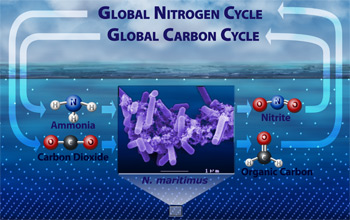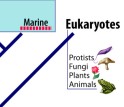News Release 05-164
Marine Microorganism Suspected to Play Role in Global Carbon and Nitrogen Cycles
Scientists successfully grow "dwarf belonging to the sea" in laboratory

Researchers discovered that Archaea may play a key role in global nitrogen and carbon cycling.
September 21, 2005
This material is available primarily for archival purposes. Telephone numbers or other contact information may be out of date; please see current contact information at media contacts.
Scientists are now revisiting, and perhaps revising, their thinking about how Archaea, an ancient kingdom of single-celled microorganisms, are involved in maintaining the global balance of nitrogen and carbon. Researchers have discovered the first Archaea known to oxidize ammonia for energy and metabolize carbon dioxide by successfully growing the tentatively named, Nitrosopumilus maritimus, in the lab.
"Data from several cultivation-independent, molecular experiments led us to suspect that Archaea could be involved in the marine nitrogen cycle. Subsequently having the organism isolated in the lab allowed us to confirm our suspicions," said David Stahl, professor of civil and environmental engineering at the University of Washington. Stahl's lab group specializes in environmental microbiology and how microbial communities function in diverse locations including the oceans, hot springs, animal intestines and the human mouth.
Archaea have primarily been associated with extreme environments like hot springs and deep-sea vents, but about a decade ago molecular studies proved their abundance in more common environs including the open ocean, freshwater and soil. Subsequent efforts to grow various samples of these organisms led to this cultivation of N. maritimus, or "dwarf belonging to the sea," by Stahl and scientists at the Woods Hole Oceanographic Institution.
They report their work in the Sept. 22 issue of the journal Nature.
As the true range and relationship of Archaea to other microbes is revealed, information about N. maritimus will serve as benchmarks for all microbiologists. Biochemical and genomic studies are already underway to learn the mechanisms by which N. maritimus uses nitrogen and how its physiology compares to other microorganisms.
The National Science Foundation's (NSF) Microbial Observatories (MO) program as well as an NSF postdoctoral fellowship in microbial biology supported this work. In addition to molecular and genome-enabled studies, the MO program funds new developments in the laboratory cultivation of novel microorganisms—a worthy endeavor considering that less than 1 percent of Earth's microorganisms have been cultured in the lab.
Matt Kane, NSF program manager for this research said, "This is a great example of how new approaches to microbial cultivation and cutting-edge molecular techniques can complement one another to achieve big advances in our understanding of the complexity of our global ecosystem." Kane says studies like these continue to highlight the importance of non disease-causing microorganisms and their critical role in our understanding of global environmental cycles.
-NSF-
-
The Tree of Life is currently divided into three kingdoms, bacteria, archaea and eukaryotes.
Credit and Larger Version
Media Contacts
Richard (Randy) Vines, NSF, (703) 292-7963, email: rvines@nsf.gov
Program Contacts
Matthew D. Kane, NSF, (703) 292-7186, email: mkane@nsf.gov
Principal Investigators
David Stahl, University of Washington, (206) 685-3464, email: dastahl@u.washington.edu
The U.S. National Science Foundation propels the nation forward by advancing fundamental research in all fields of science and engineering. NSF supports research and people by providing facilities, instruments and funding to support their ingenuity and sustain the U.S. as a global leader in research and innovation. With a fiscal year 2023 budget of $9.5 billion, NSF funds reach all 50 states through grants to nearly 2,000 colleges, universities and institutions. Each year, NSF receives more than 40,000 competitive proposals and makes about 11,000 new awards. Those awards include support for cooperative research with industry, Arctic and Antarctic research and operations, and U.S. participation in international scientific efforts.
Connect with us online
NSF website: nsf.gov
NSF News: nsf.gov/news
For News Media: nsf.gov/news/newsroom
Statistics: nsf.gov/statistics/
Awards database: nsf.gov/awardsearch/
Follow us on social
Twitter: twitter.com/NSF
Facebook: facebook.com/US.NSF
Instagram: instagram.com/nsfgov



